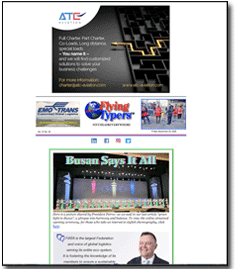The Garden City Hotel in Long Island,
New York with its distinctive cupola originally designed by Stanford White
atop the structure, has been a landmark hostelry in New York for over 125
years.
Here was the ground zero center
of the global aviation universe for a couple of days in 1927, situated at
the exact spot from where a young air mail pilot and soldier of fortune
named Charles Lindbergh spent his last moments sleeping fitfully upstairs,
resting his head on a pillow for a few hours, while downstairs the press
corps plugged in the rest of the world to the news that an attempt was about
to take place for one man to fly across the Atlantic Ocean alone.
Soon
enough “The Lone Eagle”, as Lindy was dubbed, emerged from his
slumbers and took the short ride over to Roosevelt Field in the early morning
mist. The flight that changed the world took off in a tiny monoplane, heavy
with fuel that caused it to barely skim over the tree tops at the end of
the runway. From that point, the world held its breath and followed that
flight.
The next evening when Lindbergh
landed at Le Bourget Field in France, the Garden City Hotel had hosted the
first flier to cross the Atlantic. Today that Garden City Hotel no longer
looks like it did in 1927: it was lost in a fire. In its place, The Garden
City Hotel in 2022 is a big beautiful modern hostelry. It radiates opulence
and success with few traces of its glorious past, aside from the one that
has mattered for about 100 years.
Surely
this is the best place to celebrate reaching a milestone, with the greatest
credentials tied to world aviation.
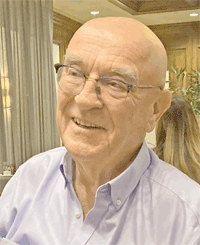 On
October 1st, EMO Trans Global Logistics people celebrated the 50th Anniversary
of service to the U.S. In this place so hallowed to aviation the spirit
and the finely crafted traditionalist hand of EMO U.S. founder, the late
Joachim “Jo” Frigger was fondly remembered by Mr. EMO himself,
Eckart Moltmann, who today at 84 travelled to honor and celebrate 50 years
of service in the U.S. of the company now branded EMO Trans Global Logistics. On
October 1st, EMO Trans Global Logistics people celebrated the 50th Anniversary
of service to the U.S. In this place so hallowed to aviation the spirit
and the finely crafted traditionalist hand of EMO U.S. founder, the late
Joachim “Jo” Frigger was fondly remembered by Mr. EMO himself,
Eckart Moltmann, who today at 84 travelled to honor and celebrate 50 years
of service in the U.S. of the company now branded EMO Trans Global Logistics.
EMO, an endearment attached to Eckart’s
name as a young man, ended up being used as an "easy to remember and
pronounce" branding device for the company he created in Stuttgart
in 1965 as a one-man shop.
EMO on this
past Saturday night fondly recalled his friendship with Jo and admitted
that he never dreamed that eventually the company he began, “would
end in 2022 as a global power.”
But
this night’s celebration belonged to the visionary and inspirational
leader of EMO Trans, Jo Frigger, his loss keenly felt in an outpouring of
affection by those who knew him well.
Today
there is no doubt where the heart of EMO Trans beats: the EMO Trans World
Headquarters, the seat of the global enterprise, is just down the street
from the Garden City Hotel. Jo Frigger, it can be said without hesitation,
is the person that put it all together in the U.S., half a century ago.
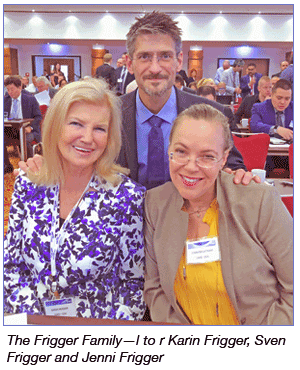 I
believe Jo Frigger never spent a minute wondering what was the best thing
to do. He knew he would win if he built a great team and emphasized quality
without concessions. He never put himself out there for the credit either,
he always knew the glory would come, so he avoided directing personal attention
on himself. I
believe Jo Frigger never spent a minute wondering what was the best thing
to do. He knew he would win if he built a great team and emphasized quality
without concessions. He never put himself out there for the credit either,
he always knew the glory would come, so he avoided directing personal attention
on himself.
Jo did the smart thing of
creating a true success that built strength upon strength with a team that
today knows its ticket was punched to succeed, even without him.
Witness
EMO Trans Worldwide 2022 delivering a solid success now from Asia to Europe
and the Americas, led by the Frigger family, including Chairwoman Karin
Frigger, with key positions occupied by next generation Sven and Jenni Frigger
and Jo’s hand-picked leader, Marco Rohrer, who serves as President
and CEO.
Marco has led the charge into
building the EMO brand in China and oversees the program everywhere else.
Today as a new era continues to unfold, safe to say, this company born on
a wing and a prayer as compared to some others, continues to move unstoppably
toward an even brighter future ahead.
Here
is an ultimate one-on-one interview created with Jo by our team during the
years we had the pleasure of being with him.
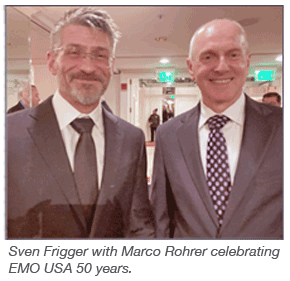 If
this feels a bit like Jo, who died April 19, 2021, is still with us, it
is probably because in very many ways he still is. If
this feels a bit like Jo, who died April 19, 2021, is still with us, it
is probably because in very many ways he still is.
“The
vocational course to the airline industry is arrow-straight for the educationally
dedicated and the community of popular enthusiasts. For others, even for
those who have achieved high-level office — and in the present context,
air cargo — it is a winding, accidental route.
For
Joachim Frigger, who has been more than a half-century in the world of air
shipping, it was purely “coincidental”. The coincidence turned
out to have a life of its own. It proved that, in Frigger’s specific
case and ultimate record, that Disraeli’s observation that life has
a value only when it has an objective, it was a perfect fit for EMO Trans’
chief executive.
EMO Celebrates 50
The present is time for celebration at EMO.
A birthday cake is in order — a cake with 50 glowing candles to
mark an ascent from a modest facility near Frankfurt’s Rhein Main
Airport to an impressive base close to New York’s John F. Kennedy
International Airport.
The years in between have been a hardy adventure
in the complexity of rampant competition, customer demands and targeted
yields. But Frigger’s close personal attention to management and
detail, deep concern about customer satisfaction on a global scale, and
a spirited participant in industry affairs, have been a colorful if ardent,
but carefully directed, substantial industry status.
Over the decades, EMO has been built into
a freight forwarding firm that offers a complete range of global shipping
services, standard or individualized. They extend to warehousing, distribution,
etc. The company’s market share is equally divided between air and
ocean transport.
Asked to comment on how he found cargo-handling
conditions at the airport, Frigger’s instant response, spoken flatly
and with obvious emphasis, was that “many airports need substantial
improvements”. Without identifying airports under criticism, he
underscored the vital importance of quick availability of freight arrivals.
There have been instances where customs clearance procedures were not
in full step with jet flight. He also took aim at procedure applicable
to pickup-and-delivery motor vehicles. In regard to the latter, he remarked
on his utter frustration watching long lines of trucks waiting to pick
up their loads. Returning to a more conversational tone, EMO’s chief
noted the disparity of cargo-handling standards at airports both here
and abroad.
The number of airports around the world
that Frigger has come to know are virtually countless. Asked to estimate
how many air miles he has logged in his career, he cheerfully stated:
“Enough to be a lifetime member of many airline frequency flyer
programs.” At any rate, asked which airports he considered the world’s
best from a cargo-service standpoint, his choices were Frankfurt Airport
and Singapore’s Changi Airport.
A native of Opladen, Germany, Joachim Frigger’s
high school education was broadened at a school of business, leading to
an apprenticeship program in Cologne. He joined Haniel in that city in
1958. Four years later he began a decade-long association with Deugro,
which brought him from Cologne and Düsseldorf IST-Hochschule to New York.
It was here where Frigger took over the presidency of EMO Trans, an international
freight forwarding operation with a market share divided 50-50 between
air and ocean. Married to Karin, who also worked in the early New York
EMO organization, and with a son and a daughter today serving in key EMO
positions, the Frigger identity has been extended to a second generation:
Jennifer is Vice President, Sales and Marketing, Sven is Vice President,
Compliance. As the old saying goes, like father, like son (and daughter).
With a long history of often bumpy relations
between the airlines and forwarders in the back of his mind, Jo Frigger
presented his interpretation of the current state of their relationship.
Referring to Cargo Network Services, he said: “Under capable leadership,
CNS provided a fairly open dialogue between airlines and freight forwarders.
Now that CNS is totally dominated by IATA, the constructive exchange is
basically gone. IATA obviously prefers this rather than expanding the
CNS model to other countries. A lost opportunity for the entire industry.”
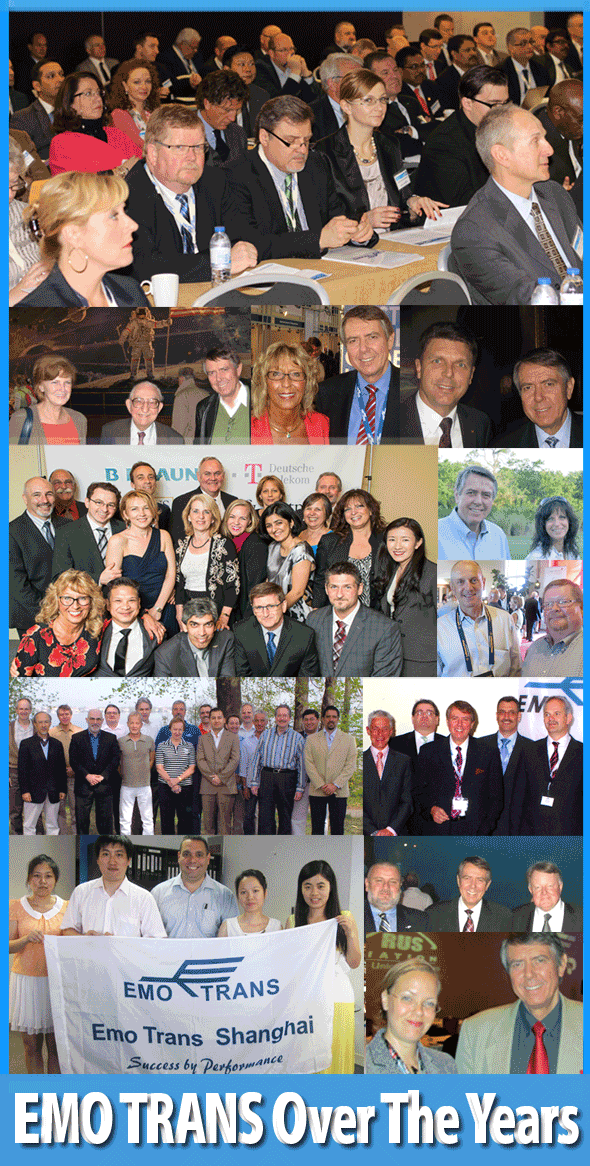
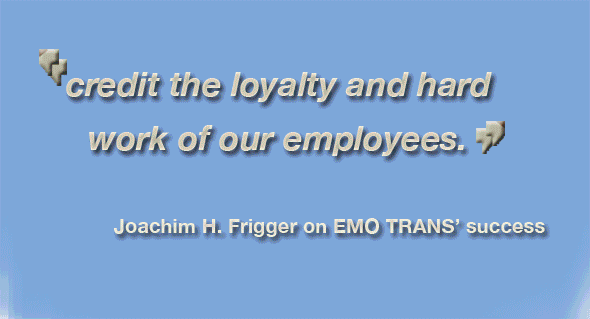 |
Of course, change is in the air for all
of the business of airborne shipping. To what extent has the nature of
air freight forwarding undergone change?
“Tremendous,” he declared, his
voice rising. “Vast changes in terms of electronic tools. The system
of e-freight is utilized to an important extent. Competition between forwarder
and integrator is fierce. However, the integrator will never be able to
provide the specialized service of an air freight forwarder. Apart from
what I have said, there has been very little change in fundamental needs
for customer service and relations.”
Queried whether the availability of widebody
cargo bellies reduced the need for all-cargo lift, his reply was a simple
“No”.
Customer complaints? Perish the thought
of absolute serenity. Customers, Frigger reported, voice several levels
of upset at the alleged result of lack of transparency in the airlines.
A standard question in this series of interviews
is whether price or service is the prime concern of the air shipper. Put
to this question, Frigger said: “both” and preferred to leave
it at that.
EMO’s head again made short work of
a question seeking his opinion of the current international air freight
rate situation. “Complex and confusing,” he smiled.
Confined to the freight forwarding sector
of the air transportation business, does a position in management —
sales, traffic, operations, etc. — does the employee’s responsibilities
and often complex related activities convey the knowledge of a person
deep in an authentic profession? Or is it simply “a better job.”
At that level, Frigger said: “the task requires a professional,
an individual loaded with expertise to handle the challenges. And with
enthusiasm, I might add.”
How far has the company gone to comply with
cargo–security regulations? Jo Frigger swiftly conveyed an impression
of high-priority imperative. Speaking in measured tone, he stated: “We
have our own screening stations and work very closely with the TSA to
secure all cargo we handle.” Cargo security, he added is an obligation
“we embrace”, attuned to a conviction that air cargo business
is a people business. Jo leans heavily on personal customer contact, underscoring
reliance on “human ingenuity”, to cope with problems that
seemingly endlessly arise in both cargo modes, distribution, warehousing
and “all international transportation needs.”
Ah! That Jo Frigger: “Open dialogue
will improve mutual understanding and appreciation of each problem as
unique. It applies to dealing with the airline, and it applies to dealing
with the customer. It is what has worked for EMO Trans over the years”.
By physical attitude, expressive gesture and word, EMO’s CEO asserted
the centrality of customer satisfaction.
“In line with the old but still worthy
concept that cooperation is the basis of success, EMO has found that often
the effort to meet customers’ special requirements will translate
into a zone of creative muscle. It inevitably leads to greater efficiency
in customer service—and satisfaction. As corporate mottoes go. EMO
clings to one of its own: Success Is Performance.”
That was indeed Jo Frigger in body and soul.
Industry experience in post-deregulation
years has produced a number of air freight forwarding executives who have
claimed being pinched by the total absence of regulations.
No, they are not opposed to deregulation,
but they wish the Civil Aeronautics Board before it was dissolved in 1978
had left behind a regulation or two to keep the industry a bit more orderly.
Did Frigger agree? “Not at all!” declared Jo, Jo being Jo.
Readers familiar with this series of interviews
are aware that the subject of an interview is usually asked to identify
individuals who have exerted an impact on their career. In an uncommon
response to the demand, Jo Frigger instantly said, “My parents.”
Having succeeded in getting this tribute on the record, he named Gustav
Grosskopf, his mentor during his years in Cologne and Duesseldorf. Then
Frigger gave the question a little more consideration and added: “Many
of my friends around the world.”
Virtually every air cargo employee has at
least one story to relate about an exciting or unusual event. Jo Frigger
is no exception, but he chose to divide his four examples into operations
and corporate-related markers: chasing lost air freight in Turkey (1964);
supplying Red Cross aid to Palestinian refugees in Jordan (1968); EMO
Trans’ opening in New York; and developing the firm into an authentic
global organization.
A request to share a suspicion of a possible
lurking market or industry “danger” in the foreseeable future
produced a tongue-in-cheek answer: “Only when planes stop flying.”
On the topic of air cargo industry changes,
Frigger was brought to full voice: “The basic responsibility in
the industry for the freight forwarder is to move cargo from manufacturer
to consumer by utilizing carriers, warehouses, and customs facilities.”
What Changes?
“In that regard, the responsibility
of the freight forwarder has not changed much — not even the speed
of the carriers. Airplanes and ships don’t move much faster than
they did 40 years ago. What has changed is the speed of communication
and customer demand for total transparency of the location of the cargo
at each step of the logistics chain. What also has changed is the strong
demand of customers for environmental sustainability. While this has been
mastered by some of the service providers involved, there is still a lot
of room for improvement.”
Take A Bow. With EMO Trans USA at age 50,
Jo Frigger always gave credit to “the loyalty and hard work of our
employees.” For the existence of a global organization, “Jo
Being Jo” Is most fondly remembered continuing on to say: “I’ve
found that looking back however is less beneficial planning forward.”
That was Jo, brothers and sisters . . .
Geoffrey
 |
|




